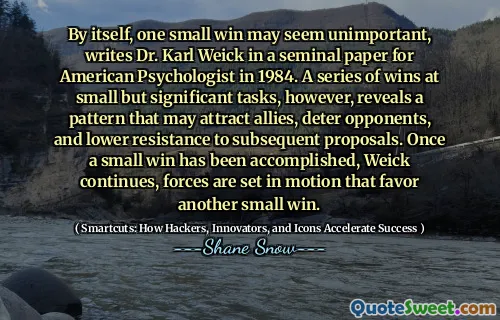
By itself, one small win may seem unimportant, writes Dr. Karl Weick in a seminal paper for American Psychologist in 1984. A series of wins at small but significant tasks, however, reveals a pattern that may attract allies, deter opponents, and lower resistance to subsequent proposals. Once a small win has been accomplished, Weick continues, forces are set in motion that favor another small win.
This quote emphasizes the profound impact that small, incremental successes can have on long-term progress and organizational change. Often, individuals and organizations underestimate the power of minor achievements, perceiving them as insignificant in isolation. Yet, as Shane Snow discusses in 'Smartcuts', such small wins act as catalysts that generate momentum. Achieving these victories fosters a sense of confidence and can influence perceptions, making allies more inclined to support further initiatives and opponents more hesitant to resist. The concept aligns with the principles of behavioral psychology, where repeated small successes reinforce positive habits and beliefs, leading to exponential growth over time. In the context of innovation and leadership, this approach underscores the importance of setting manageable goals that collectively contribute to larger ambitions. It’s a reminder that complex challenges are often best tackled with patience and persistence, breaking them down into achievable steps. Each small win not only pushes the project forward but also alters the internal and external environment—building credibility, creating new pathways, and establishing a pattern of success. This strategic focus on incremental progress empowers individuals and teams to stay motivated, even when immediate results are not overwhelmingly visible. Moreover, recognizing the ripple effect of small wins encourages a culture of continuous improvement, where perseverance is valued, and progress is celebrated at every step. Thus, the accumulation of small wins becomes a powerful strategy for sustained success and overcoming the inertia that often hampers significant change.






